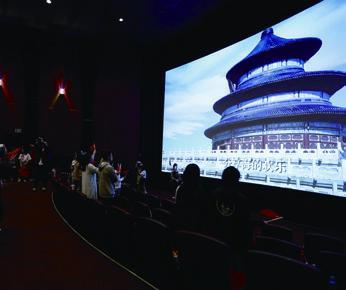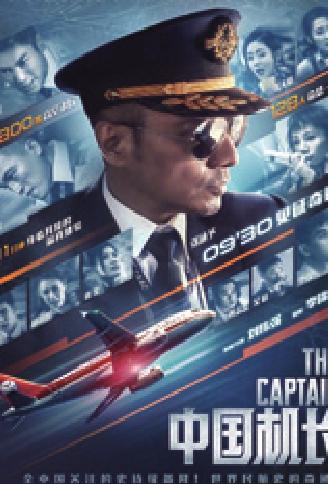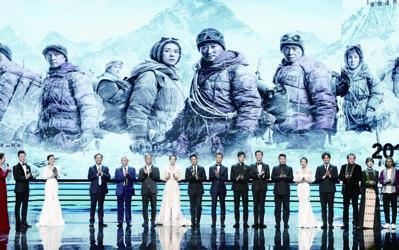PEOPLE’S HEROES
2019-11-05ByJiJing
By Ji Jing
My People, My Country, a patriotic film that premiered in China on September 30 in celebration of the 70th anniversary of the founding of the Peoples Republic of China (PRC), had raked in 2.56 billion yuan ($360 million) by October 13, the eighth highest revenue grossed by a domestic film.
In addition, several more films were released on the same day, continuing the trend of highlighting the heroism of ordinary Chinese people during the past decades and bagging huge box-office revenue.

A kaleidoscope of heroes
Patriotism and realism reflected in My People, My Country are the top two elements that have won the audiences hearts.
“In the seven stories in My People, My Country, historical events are no longer the subject like in previous films. The protagonists are no longer the main creators of history. Instead, they both participate in the narrative. The tension between history and the individual is resolved,” Zheng Yang, a teacher with the School of Humanities at Shanghai Normal University, said after watching the movie.
Zheng added that with China entering a period of high-speed growth, the film industry has become industrialized, with patriotic films no exception. “However, an overreliance on technology can divert the genre from realism. My People, My Country, which focuses on ordinary peoples connection with the countrys development during the past seven decades, is all the more precious against such a backdrop,” he said.
“We want to represent the people rather than simply depicting the events in this film. We dont want to simply sing praises of Chinas achievement over the past 70 years, we want to show that all the achievements have been made thanks to the Chinese peoples efforts. This is very important,” Chen Kaige, a famous movie director and one of the directors of this co-directional venture, told People.com.cn in a video interview.
He stressed, “Our principle in making the film was to find the meeting point between ordinary people and major events and we can see from the film that major events are like bolts of lightning which illuminate peoples lives and transform their spiritual outlook and emotions.”
A miraculous escape
The Captain, directed by Andrew Lau, is also based on a real incident.
On May 14, 2018, a Sichuan Airlines flight from Chongqing to Lhasa in southwest Chinas Tibet Autonomous Region, made a miraculous escape when a cockpit window broke. It caused a sudden drop in the air pressure inside the aircraft, leading to the copilot almost being sucked out. He was saved by his seat belt. The temperature plunged to minus 40 degrees Celsius.
But against great odds, Captain Lius Chuanjian managed to land the plane and keep all 128 onboard safe. It was regarded as a miracle in civil aviation history and Liu and his crew were honored by the Civil Aviation Administration of China and Sichuan Provincial Government.


For greater authenticity, the production team bought a life-size replica of an Airbus A319 and the cast—especially those who played the captain, co-captain and flight attendants—studied their prototypes to give their characters the right touch.
“The personal charisma and professionalism the crew members demonstrated during the incident to ensure the safety of the passengers is the biggest highlight of the film and the change in the relations between the crew and passengers from confrontation to mutual trust is the most touching part,”film critic Ma Xinrui said.
The film focused on the team spirit of the crew in the face of crisis and peoples different reactions while hanging between life and death. “This is what distinguishes the film from previous films lauding heroes,” Ma added. “Besides, it told the stories untold by plain and impersonal news reports.”
“We want to reflect the professionalism of the Chinese aviation industry through the film to encourage more people to do their work well and contribute to the country and the people. With this year being the 70th anniversary of the founding of the PRC, we released the film to show the whole world how great the Chinese aviation industry is and instill a sense of pride in viewers for the country and its people,” Yu Dong, President of the Bona Film Group, one of the producers of the film, said.
Peak performance
The Climbers, directed by Daniel Lee and produced by the Shanghai Film Group Corp., is based on two expeditions by Chinese climbers to Mt. Qomolangma, the highest mountain in the world.
In 1960, three Chinese climbers, Wang Fuzhou, Qu Yinhua and Gongbu Dorje, were the first to reach the summit from the perilous northern side, becoming the first men to do so. However, the feat was not recognized internationally as the team failed to provide any evidence. They could not take photos of their summit as it was too dark and the mementos they left on the top were blown away by the raging winds.
To vindicate the Chinese climbers, a gigantic team of over 400 members was put together in 1975. During this expedition, nine climbers reached the top. They included Pan Duo, who became the first woman to achieve the feat from the northern side. The expedition also measured the height of the peak—8,848.13 meters.
Author Alai, winner of the Mao Dun Literature Prize, one of Chinas top literary awards, wrote the film script. He had the good fortune of being able to interview all three climbers from the 1960 ascent in 2014.
“The protagonists of the film… are ordinary people who demonstrate the spirit of self-sacrifice for the mountaineering cause,”a commentary on the film in Hunan Daily said. For instance, one of the 1960 climbers suffered frostbite, which led to the amputation of his right leg.
The film combines virtual images of Mt. Qomolangma created through special effects with aerial videos of the mountain. The stellar cast includes veteran actress Zhang Ziyi playing the meteorologist Xu Ying who helps the climbers during the second expedition, and Wu Jing, who directed and starred in the action blockbusters Wolf Warrior I and II and also starred in the science fiction blockbuster The Wandering Earth. Wu plays Fang Wuzhou, one of the 1960 summiteers.
The actors underwent training to climb in extremely cold temperatures bearing heavy weights. Wu hired a professional climber and not only learned climbing techniques but also had a go at the snowcapped Gangshika Mountain in northwest China, which is over 5,000 meters high, to get first-hand experience. During the training, he learnt what it was like to suffer from altitude sickness and bone-chilling cold. But he learned to overcome them, much as the climbers before him had done.
